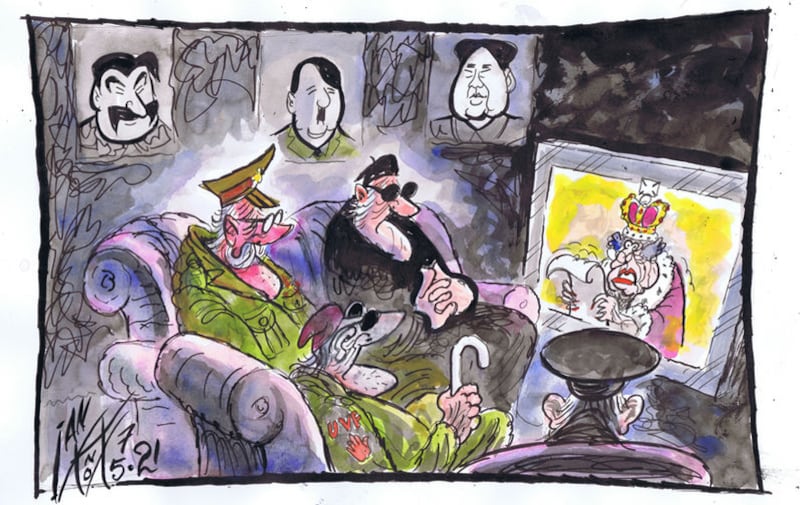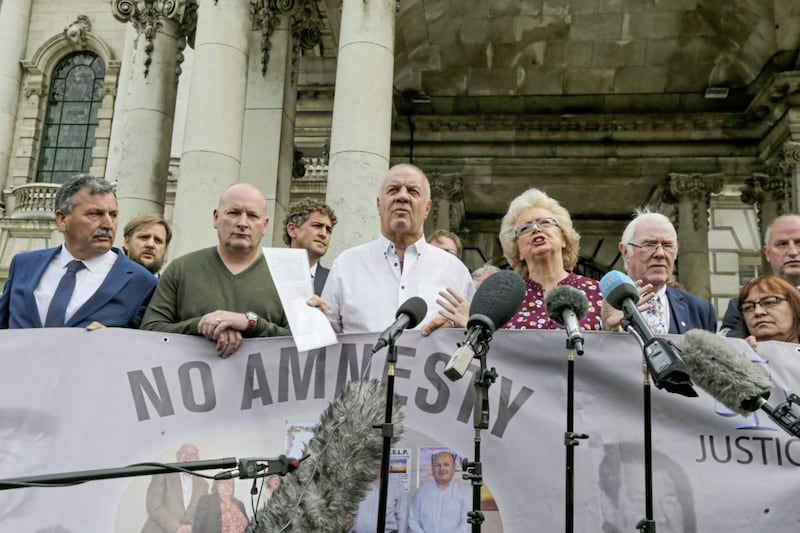THE taoiseach has warned the British government that any move to unilaterally bar prosecutions for Troubles-related crimes would be a "breach of trust".
Micheál Martin was speaking following reports that next Tuesday's Queen's Speech will include plans for a statute of limitations for offences committed before the signing of the Good Friday Agreement.
The announcement would coincide with the verdict of the inquest into 1971's 'Ballymurphy Massacre' in which 10 people were shot dead by British army paratroopers.
The content of yesterday's newspaper reports, based on unattributed briefings, sparked an angry response from victims' groups and politicians of all hues.
Anger in Dublin at the proposal was heightened after it emerged that Secretary of State Brandon Lewis apparently did not mention the plan during a meeting with Foreign Affairs Minister Simon Coveney on Wednesday.
Under the proposal, sketched out in reports carried by the Daily Telegraph and The Times, the British government would introduce a statute of limitations on prosecutions that would apply to the vast majority of killings during the conflict.
It is designed to protect British army veterans, a number of whom have faced the courts in recent years for historical offences in Northern Ireland, though an exemption would apply to war crimes, such as torture, according to the reports.
However, the new law would also be expected to apply to paramilitaries.
If passed into legislation, it would would signal the scrapping of a key mechanism agreed by the British and Irish governments, alongside four of Stormont's five main parties, in the 2014 Stormont House Agreement.
The Stormont House proposals included a new independent investigation unit to re-examine all unsolved killings but it did not offer a complete amnesty of the kind being floated.
A British government spokesperson said it was committed to "delivering its manifesto commitments to veterans who served in Northern Ireland".

"We want to deal with the past in a way that helps society in Northern Ireland to look forward rather than back.
"It is clear to all that the current system for dealing with the legacy of the Troubles is not working for anyone, failing to bring satisfactory outcomes for families, placing a heavy burden on the criminal justice system, and leaving society in Northern Ireland hamstrung by its past."
But the taoiseach warned the British government over acting unilaterally.
"The Irish government is very clear. It has an agreement in place with the British government and with the parties of Northern Ireland and with many victims' organisations. That is the Stormont House agreement of 2014," he said.
"Any unilateral move from that would be a breach of trust, as far as we are concerned."
Mr Martin said victims were the priority for his government
Sinn Féin and the DUP were both also critical of the reported proposal.
Mary Lou McDonald said the reports had come as a "devastating blow" to victims and the Sinn Féin leader urged the Dublin government to "stand up" for the Stormont House deal.
"What Boris Johnson and the British government is doing is an attempt to put British soldiers above the law and prevent investigations into murder, torture, shoot-to-kill and collusion involving British forces in Ireland – this is an attack on the rule of law."
DUP MP Gavin Robinson said veterans should not be subjected to a "cycle of reinvestigations" in the absence of new evidence but insisted that access to justice was a vital principle in dealing with its past.
"There has been a deliberate attempt by some to conflate protections for armed forces veterans with some sort of blanket protection against any prosecution.
"We must be clear that if someone has committed murder, they should be prosecuted for that crime regardless of who they are."
SDLP leader Colum Eastwood described the reported plan as a "betrayal of victims and survivors".
"These plans demonstrate that this government is more interested in keeping Tory backbenchers sweet than delivering truth, justice and accountability for horrendous crimes committed here – it is totally appalling," he said.
Alliance deputy leader Stephen Farry described the plan as a "shameful course of action".
Ulster Unionist MLA Doug Beattie, whose party did not endorse Stormont House, said he was opposed to a general amnesty for Troubles-related offences.
“The current arrangements are far from perfect, but I do not believe that the answer lies in bringing about a situation that gives equivalence between the forces of law and order and those self-appointed murderers who sought to bring mayhem and anarchy to this society,” he said.
Read More
- Troubles troops amnesty announcement timed for day of Ballymurphy Massacre inquest conclusion
- Bloody Sunday relatives say soldier amnesty means 'Irish lives don't matter'
- Tony Blair government considered previous Troubles amnesty
- Analysis: Leaked amnesty proposal is clumsy and callous (premium)
- Analysis: Stormont's devolved justice powers could scupper UK amnesty plans (premium)
- Plans to restrict future prosecutions of British soldiers who served during Troubles branded an 'insult' to victims
- UK government unilateral plan simultaneously scraps Historical Investigations Unit and revives 'Troubles museum'
- Timeline: Attempts to address legacy of violence in NI







